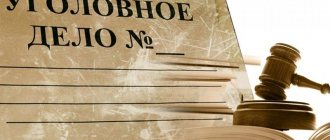ST 294 of the Criminal Code of the Russian Federation.
1. Interference in any form with the activities of the court for the purpose of obstructing the administration of justice is punishable by a fine in the amount of up to two hundred thousand rubles or in the amount of the wages or other income of the convicted person for a period of up to eighteen months, or by forced labor for a term of up to two years. , or arrest for a term of up to six months, or imprisonment for a term of up to two years.
2. Interference in any form in the activities of a prosecutor, investigator or person conducting an inquiry, in order to impede a comprehensive, complete and objective investigation of the case, is punishable by a fine in the amount of up to eighty thousand rubles or in the amount of the salary or other income of the person convicted of a period of up to six months, or compulsory work for a period of up to four hundred eighty hours, or arrest for a period of up to six months.
3. Acts provided for in parts one or two of this article, committed by a person using his official position, are punishable by a fine in the amount of one hundred thousand to three hundred thousand rubles or in the amount of the wages or other income of the convicted person for a period of one to two years, or forced labor for a term of up to four years with deprivation of the right to hold certain positions or engage in certain activities for a term of up to three years or without it, or imprisonment for a term of up to four years with deprivation of the right to hold certain positions or engage in certain activities for a term of up to three years or without it.
Commentary to Art. 294 Criminal Code
1. The objective side is expressed in the form of actions to interfere in any form in the activities of the court (Part 1) or the prosecutor, investigator, person conducting the inquiry, persons conducting the investigation in the pre-trial stages of the criminal process (Part 2). In the first case, interference is carried out in the activities of a judge, a panel of judges, a juror, etc. Interference is exerting influence on specified persons in any form and in any way with the aim of achieving a certain decision or creating obstacles to a comprehensive, complete, objective investigation or resolution of the case. Intervention is possible direct and indirect; in oral, written and other forms. This could be persuasion, demands, threats (except for the threats provided for in Article 296 of the Criminal Code), blackmail, intrusion of a group of people into office premises, destruction of case materials, etc. Intervention may be associated both with proceedings in a specific case, and with obstruction of the activities of an objectionable person. These actions, committed by a person using his official position (Part 3), form a qualified crime.
Actions to fail to comply with a lawful order of a judge to stop actions that violate the rules established by the court; failure to take measures based on a private ruling of the court or on the proposal of a judge; obstructing the appearance of a people's or juror in court; failure to provide information for compiling lists of jurors; failure to comply with the legal requirements of the prosecutor, investigator, investigator or official carrying out proceedings in the case of an administrative offense are qualified according to a number of norms of Chapter. 17 Code of Administrative Offenses of the Russian Federation.
2. The crime is considered completed from the moment the specified actions are committed, regardless of the onset of consequences or the expected result of the intervention.
3. The subjective side is characterized by direct intent and special goals: obstruction of justice (Part 1), obstruction of a comprehensive, complete and objective investigation (Part 2), one of these goals (Part 3).
Judicial practice: sentences and punishment under Art. 294 of the Criminal Code of the Russian Federation
- Resolution of the Plenum of the Supreme Court of the Russian Federation dated... PLENARY OF THE SUPREME COURT OF THE RUSSIAN FEDERATION DECISION dated December 27, 2002 N 29 ON JUDICIAL PRACTICE IN CASES OF THEFT,...
- Decision of the Supreme Court: Determination N 203-APU17-21... THE SUPREME COURT OF THE RUSSIAN FEDERATION Case No. 203-APU17-21 APPEAL DECISION Moscow August 31, 2021 Judicial Collegium for Military Personnel of the Supreme...
- Resolution of the Presidium of the Supreme Court of the Russian Federation dated... PRESIDIUM OF THE SUPREME COURT OF THE RUSSIAN FEDERATION DECISION dated December 5, 2018 N 126-P18 ON RESUMING PROCEEDINGS IN THE CASE DUE TO NEW...
- Judicial Collegium for Criminal Cases, appeal:... THE SUPREME COURT OF THE RUSSIAN FEDERATION Case No. 72-APU 17-21 APPEAL DECISION Moscow October 04, 2021 Judicial Collegium for Criminal Cases...
- Decision of the Supreme Court: Resolution No. 310P13 dated... DECISION OF THE PRESIDIUM OF THE SUPREME COURT OF THE RUSSIAN FEDERATION Case No. 310-P13 Moscow January 23, 2014 Presidium of the Supreme Court of the Russian Federation...
- Resolution of the Plenum of the Supreme Court of the Russian Federation dated... PLENARY OF THE SUPREME COURT OF THE RUSSIAN FEDERATION DECISION of November 15, 2021 N 48 ON THE PRACTICE OF APPLICATION BY COURTS OF LEGISLATION GOVERNING FEATURES...
- Ruling of the ECtHR dated 02/14/2017 EUROPEAN COURT OF HUMAN RIGHTS THIRD SECTION CASE “MASLOVA VS. RUSSIAN FEDERATION” (Complaint No. 15980/12) JUDGMENT…
- Resolution of the Plenum of the Supreme Court of the Russian Federation dated... PLENAUM OF THE SUPREME COURT OF THE RUSSIAN FEDERATION DECISION dated June 25, 2021 N 18 ON JUDICIAL PRACTICE IN CASES OF CRIMES,...
- Resolution of the Plenum of the Supreme Court of the Russian Federation dated... PLENAUM OF THE SUPREME COURT OF THE RUSSIAN FEDERATION DECISION dated December 17, 2021 N 43 ON SOME ISSUES OF JUDICIAL PRACTICE IN CASES...
- Decision of the Supreme Court: Determination No. 38-АПУ17-2 dated... THE SUPREME COURT OF THE RUSSIAN FEDERATION No. 38-АПУ17-2 APPEAL DECISION Moscow March 1, 2021 Judicial Collegium for Criminal Cases of the Supreme Court...
Second commentary to Art. 294 of the Criminal Code of the Russian Federation
1. Interference covers any influence on judges, jurors or arbitration assessors (Part 1), which significantly violates the principles of legal proceedings enshrined in legislation, or on the activities of a prosecutor, investigator or person conducting an inquiry (inquirer), in order to impede comprehensive, complete and objective investigation of the case (part 2). Such influence can be exerted both directly and through third parties - relatives, acquaintances, colleagues, etc.
2. Crimes are considered completed from the moment of interference in the activities of these persons.
3. From the subjective side, crimes are characterized by direct intent. The law specifies their purpose - obstruction of the administration of justice (Part 1) or a comprehensive, complete and objective investigation (Part 2).
4. The subject of the crime is a person who has reached the age of 16 years.
5. In part 3 of Art. 294 of the Criminal Code specifies the use of one’s official position by a person as a qualifying sign of obstruction of both the administration of justice and the conduct of a preliminary investigation (see commentary to Articles 201 and 285 of the Criminal Code). Additional qualifications of his actions in such cases under Art. 285 or 201 of the Criminal Code is not required.
Obstruction of justice as a separate type of crime
The article for obstruction of justice is in the current Criminal Code under No. 294, and determines the penalties for this type of crime.
However, what can be called justice? Let's try to understand the basic definitions. The term “justice” is usually understood as a set of judicial activities aimed at maintaining the rule of law and the interests of citizens. The key tasks of the justice system are considered to be comprehensive and objective consideration of cases in compliance with all procedural norms and current legislation.
Download for viewing and printing:
Article 294 of the Criminal Code of the Russian Federation dated June 13, 1996 N 63-FZ (as amended on February 19, 2018)
On this basis, any actions aimed at changing a legal decision in a specific case can be considered interference in justice. This can be any form of negative influence: threats, blackmail, direct orders, promises of any material benefits. In addition to active actions, inaction can also be considered interference, for example, when a judge is deliberately delayed in providing housing or other required privileges.
In addition, obstruction can be considered attempts to influence the adoption of a fair decision by destroying material evidence or materials of the case under consideration, deliberate failure to serve subpoenas on participants in the process, and other similar actions.
Important! Pre-trial proceedings: collecting evidence, conducting inquiries and investigative activities are not considered justice. This is due to the fact that the results of the listed actions cannot influence the court’s decision when passing a sentence. However, interference in pre-trial actions is also considered a criminal offense under Article 294 of the Criminal Code of the Russian Federation.
What constitutes a crime
The composition of such crimes is determined formally: the crime is considered committed immediately after the accused takes measures that could obstruct justice.
In this case, whether the attacker achieved the desired result or not no longer plays a decisive role: criminal liability arises in any case. However, the consequences that resulted from the illegal action will be taken into account when determining the punitive measure. For example, as a result of the intervention, an innocent person was illegally convicted, damage was caused to the property interests of citizens or harm to health. In these situations, penalties will be assigned based on the totality of the crimes under consideration.
Against this background, the justice system as a whole becomes the object of the crime, including the conduct of pre-trial investigative measures (Part 2 of the article in question). The personal interests of citizens can act as an additional object of crime, for example, if an illegal action caused any damage to a person’s life.
An objective characteristic of a crime is an action that interferes with the normal activities of the judiciary and investigative authorities. This is usually expressed in an attempt to change the decision in favor of the accused or obstruction of an objective decision.
Important! Cassation appeals, petitions, citing various formulations of a possible decision or making requests for the administration of justice do not constitute a crime under Article 294 of the Criminal Code of the Russian Federation. However, if an oral/written request is combined with any forms of material gratitude, the actions may have a criminal component.
Legal practice
Let's look at a few examples from judicial practice on sentencing for obstruction of justice.
Example No. 1.
A certain Avdeev (not his last name), convicted under Articles No. 167 and No. 318 of the Criminal Code of the Russian Federation and sentenced to 5 years in prison, was summoned by the investigator to the interrogation room. Here, a representative of the authorities acquainted him with the materials of the case, after which he left, leaving Avdeev under the guardianship of the guard. Taking advantage of the moment, the convict tore out several sheets of paper from a folder lying on the table and tried to swallow them; the actions of the guard prevented him from carrying out his plan.
An appeal filed by Avdeev’s lawyer about the illegality of applying Article 294 of the Criminal Code of the Russian Federation to his client was rejected by the court of the city of Syktyvkar. The suspect's guilt has been fully proven; his statement about the fabrication of facts on the part of the investigator was found to be unfounded, which was confirmed by witness testimony and the results of the examination.
The court sentenced Avdeev to 12 months in prison for attempting to obstruct an objective investigation. By adding up the sentences, the total term of imprisonment was 6 years.
Example No. 2.
When the Perm court was considering a case of an administrative violation by citizen Gribalov (not his last name), who was detained by traffic police officers for driving while under the influence of alcohol, the defendant tried to tear up the protocol handed over to him for review.
Gribalov fully admitted his guilt and was sentenced under Article 294 of the Criminal Code of the Russian Federation to a fine of 40,000 rubles.
Subjective signs and subjects of crime
Any capable person over 16 years of age is considered as a subject of the crime in question.
At the same time, for the formation of a crime, the interest of the perpetrator in the outcome of the case under consideration does not play a significant role. Therefore, not only the participants in the procedural proceedings, but also their relatives and other persons not involved in the case are subject to criminal liability. The qualifying feature is the use of official powers, therefore, persons vested with state power become special subjects: civil servants, authorized representatives of municipalities, law enforcement officers.
The premeditation of the accused’s actions is considered a subjective feature: here there is always direct intent aimed at obstructing the work of the justice system.
Comments on the article in question
Let us clarify several points characteristic of Article 294 of the Criminal Code of the Russian Federation:
- When attempting to obstruct justice or investigative measures, the motives of the accused do not play a significant role, although they may be taken into account when sentencing.
- The legal field of the article is divided into two independent crimes. The first part deals with the administration of justice, the second - the conduct of investigative measures.
- Only attempts to influence persons making judicial decisions: court members, assessors are a criminal offense. Similar acts committed against officials and other court employees do not constitute the crime in question.
- If obstruction of justice is carried out through bribery, the accused is sentenced based on the totality of the crimes.
Video on obstruction of justice
Similar articles
- Crimes against constitutional rights and freedoms
- Compulsion to testify
- Crimes against justice and liability for them under the Criminal Code of the Russian Federation
- Hijacking of an aircraft or water transport, train





